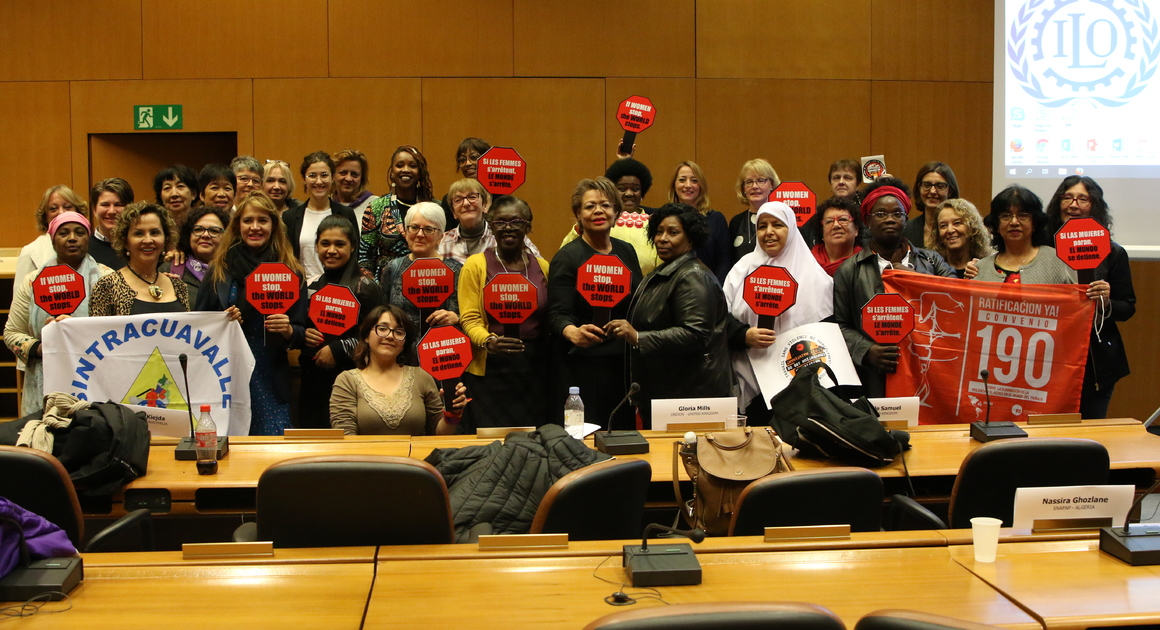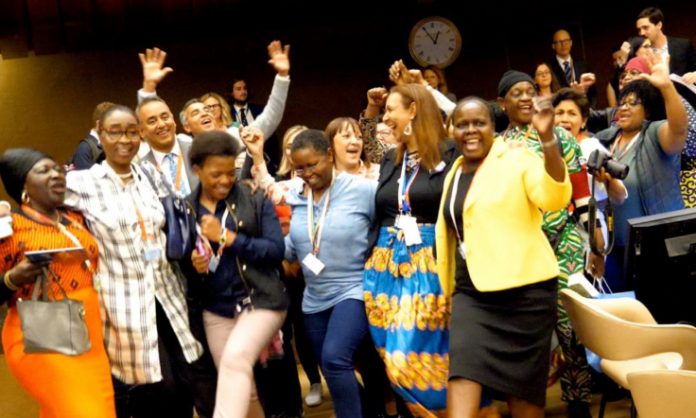On 21 June 2019, the ILO Convention C190 against Violence and Harassment, and accompanying Recommendation R206 were adopted at the International Labour Conference (ILC), on 21 June 2019. These new international labour conventions received record votes at the ILC, demonstrating an overwhelming consensus for a world of work free of violence and harassment.
While the convention was voted for by representatives of the workers, governments and employers, it is important to understand that popular actions precipitated the adoption of C190 and R206. These were organized by ordinary working-class people particularly women in workplaces, communities and on the streets, who demonstrated through their actions that they would no longer tolerate harassment, and violence against them.
There were widespread protest movements which advanced the fight against sexual harassment, putting this on the front burner of global public opinion in 2017. A clear good of this was the #MeToo Movement in which a looming figure, Harvey Weinstein who has just been found guilty and jailed, was shown for the monster he is, as unfortunately many other predators with power are. History is not simply made by institutions, rather people make institution and history.
The new convention complies with the rule on total inclusiveness and integration. It takes an inclusive and integrated approach, by extending protection to all workers whether in the formal and informal economy and irrespective of their contractual status and including jobseekers, trainees, interns, apprentices and volunteers (ITUC, 2019[1])
The fact that embers of revolt inspired adoption of the international labour covenants on violence and harassment establishes two things; that in our hands as the working masses united lies the power to change, and to change the world, and also; that freedom for the working-class comes through struggle. Although we know it is not yet Uhuru with Convention No 190 and Recommendation No 206 on violence and harassment in world of work, the battle for ratification in the ILO member states and implementation in our factories and workplaces is one we must now wage.
Gender-based violence

Sexual and gender-based violence (SGBV) refers to any act that is perpetrated against a person’s will and is based on gender norms and unequal power relationships. It encompasses threats of violence and coercion. It can be physical, emotional, psychological, or overtly sexual in nature, and can take the form of a denial of resources or access to services. It inflicts harm on women, girls, men and boys (UNHCR – Sexual and Gender-Based Violence[2]).
It is a fact that women and younger people are mostly victims of Gender-Based Violence (GBV) either in the world of work or in our communities. At least 1 in every 3 women will experience violence such as wage discrimination, abuse, economic violence, intimidation, threats or verbal abuse in her lifetime. In many cases a significant number of women experience different types of these attacks all in one work lifetime, which subjects them to terrible precarious conditions and makes the workplaces unsafe for them.
Gender-based violence (in the workplace) is predominant in the global South. In Nigeria for instance, where the youth unemployment rate is as high as 36%, it is twice unlikely for fresh female graduates to get a job, without being sexually harassed or assaulted. And many women who have spent years on the job are also subjected to experiences of sexual violence.
In June 2019, there was a case of sexual harassment of a female worker by a male management staff at the Lanxess Chrome Mine in South Africa. The management refused to take a serious approach to bringing the perpetrator to justice. That insensitive decision of the management led to a two-week massive underground sit-in strike in the mine. The immediate demands of the workers were for the perpetrator to be immediately suspended and the reinstatement of all dismissed workers. The management succumbed to the workers’ demands, because they took collective action.
Convention C190 and the accompanying Recommendation R206 will go a long way to address GBV at work. The fact that the convention integrates violence in the informal sector makes it a good win, but the truth is that the fight against Gender-based Violence is far from over. It is important that we expand the fight against Gender-based Violence beyond the workplaces into the communities and the trade unions have to take a lead on this.
An important element of Trade Union in Transformation is for unions to expand their horizon of struggle, the workers in factories are the same people in the communities. Hence it is important for workers’ organizations to defend workers’ rights beyond the traditional workplace issues. Gender-based violence and particularly attacks on women is an attack on human right.
C190 Ratification

According to paragraph 2 of article 14 of the C190, the convention will be in force 12 months after two countries have ratified it. That is, as is usually the case with ILO Conventions, C190 will not be better than an article until it’s ratified by at least two countries.
It is sad that despite the danger that Gender-based violence posed in the workplaces which is on the rise with the economy crisis, and the urgent need for actions against attacks on women, only one country in the world, i.e. Uruguay, has ratified the convention.
Nine countries including two from Africa have submitted the Convention to the appropriate authorities in their respective countries. It is a known fact that the bosses either as government officials or private sector employers will not easily comply with matters that advance the workers interest not even such as ILO Conventions when there is no serious consequence for non-compliance.
Employers’ associations in Panama, Dominican Republic openly campaign against ratification of C190. That shows how despotic the bosses are in sustaining oppression of working-class people. They care less that, aside from the workers’ perspective which is of great importance over and above any other, it will aide productivity and enhance workplace dynamics if people can work without fear of sexual violence or any other form of violence.
It is of great essence however, to recall that freedom cometh by struggle and the history of GBV, protest movements against violence and the adoption of C190 by the ILO is an history of popular actions against violence on boys, men, and particularly women and girls. Hence the trade unions, labour federations and civil society organizations should mobilize for popular action to demand for the immediate ratification and domestication of C190.
In Nigeria, we call on the NLC, TUC and ULC in collaboration with allies in the civil society organizations to organize a series of days of action to pressurise the government to immediately ratify C190. On 22nd August 2019, the CTA trade union federation in Argentina organized a march to demand the ratification of C190 among others. And millions of women across Mexico occupied the streets in organized strike actions on 9 March against Gender-based Violence. We need to draw inspiration from such actions and remain consistent in the fight against GBV in our workplaces and communities till victory.
by Lai BROWN
[1] “Stop gender-based violence in the world of work – Ratify ILO Convention 190!”, ITUC Campaign Newsletter 5 – September 2019
[2] “Sexual and Gender Based Violence”, https://unhcr.org/sexual-and-gender-based-violence.html









